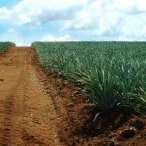
5 July 2010 | News | Forests and biodiversity | Human rights
The Truth Behind Bars
Costa Rica criminalizes the social protest and jails activists for exposing degradation of resources
Download: MP3 (2 Mb)
Costa Rica is “exported” to the world as a model of democracy. Its army-less state is usually cited as an example to be followed. However, the repression in Costa Rica does not wear uniform. It is in the judiciary to silence accusations.
In fact, on July 9, an environmental rights advocate will be tried for the mere fact of exposing that the pineapple monoculture plantations pollute the water streams, thus affecting several rural communities.
Carlos Arguedas Mora filed a complaint against Hacienda Ojo de Agua before Siquirres municipality, in the center-north of the country.
Arguedas is a long-standing environmentalist and trade union leader. He wrote on his blog aimed at exposing the attempts to criminalize the protest, that this “legal action is just the company Hacienda Ojo de Agua’s intention to prevent having to compensate the community for the serious damages it caused”.
“As a human being and as a parent I cannot allow this corporation to go unpunished for the damage it causes to the community” said Arguedas in his letter addressed at the communities of El Cairo, Luisiana and La Francia.
The website exposes the methodology used by the State and the corporations with vested interests against the people resisting these policies: “students, workers, peasants, indigenous, LGBT (lesbian, gay, bisexual, and transgender people), unemployed, etc are subject of criminalization and censorship of their messages and actions”.
48 hours after facing charges in a court hearing, Carlos Arguedas spoke with Real World Radio, and ratified its accusations and explained the strategies used by the affected communities to obtain drinking water.
The expansion of the pineapple -and banana- cultivation is a problem all over Costa Rica, but especially in Limon province, with an annual average temperature of 29 degrees Celsius and ideal conditions to harvest that crop.
The website nacion.com reported that in the last decade the crop has suffered a massive expansion, increasing the harvested area in 300 per cent.
The intensive use of agrotoxics has damaged the communities, which have witnessed water poisoning.
The Regional Institute of Toxic Substances Studies of the National University has conducted studies since 2003 in areas with pineapple crops, which showed the presence of bromacyl in the surface water from the fields.
Carlos Arguedas says the government has turned a deaf ear to his demand to declare the situation in the area a national emergency and he refuses to reach a settlement, as suggested by Ojo de Agua.
Photo: www.grain.org







